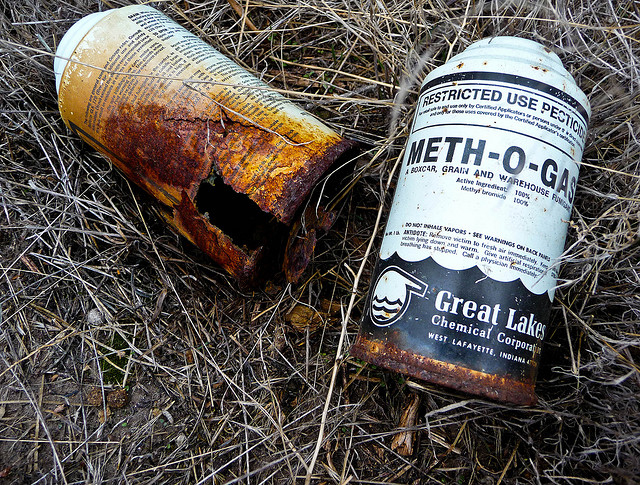
Honest, paywall-free news is rare. Please support our boldly independent journalism with a donation of any size.
It sounds more like the sinister scheme of a villain in a thriller movie than a Delaware family’s sleepy island vacation: A month ago, a tasteless, odorless, colorless neurotoxin poisoned a family of four while on vacation on the Virgin Islands. The two teenage sons remain in comas.
Turns out, it wasn’t an evil plot; it was your neighborhood pest control company, which sprayed a banned pesticide in the condominium below the family’s rented abode. In late April, an expanded investigation by the US Environmental Protection Agency (EPA) uncovered the use of the banned pesticide in Puerto Rico as well. But what about here on the mainland?
The fumigant responsible for the incident, methyl bromide, was banned for structural use many years ago due to extreme health risks. It’s also been linked to birth defects. And it was supposed to be completely phased out in the United States in 2005, for its role as an ozone depleter, through the Montreal Protocol, an international agreement, according to the EPA. (The Virgin Islands and Puerto Rico, US territories, must also abide by the EPA’s rulings.)
Yet, millions of pounds of the fumigant continue to be used – in US agriculture. Using methyl bromide on strawberries and other fruit, potting soil, nuts, grains and more, California alone used almost 4 million pounds of methyl bromide in 2012, under critical use exemptions and quarantine and pre-shipment exemptions provided by the EPA.
Acute exposures of families on vacation are sensational, dramatic and rare; exposure to pesticides on the fields and in agricultural communities, however, can be an everyday occurrence. Workers re-entering fields after fumigation may or may not see a warning sign; applications may be caught in a breeze and move toward nearby schools or homes; workers applying the chemicals may not have sufficient training, may not have access to safety equipment and may face the risk of heat illness when wearing the protective gear.
Although the exposures may not always cause seizures or a coma, it may cause other acute reactions, like headaches, dizziness, burning eyes or nausea. And chronic exposures can lead to long-term problems; long-term residence on or near a farm that uses pesticides is linked to early onset of Parkinson’s disease. It’s also on California’s Proposition 65 list, linking exposure to reproductive harm.
From a clinician’s perspective, pesticides are troubling. Acute exposures can be hard to diagnose. Methyl bromide exposure symptoms, for example, can be confused with the flu. Health issues from chronic exposures are particularly difficult to pin down on pesticides, and aren’t required to be reported to state authorities. That’s why clinicians – particularly clinicians focused on serving farm worker populations – have to maintain a heightened index of suspicion of pesticide exposure for agricultural workers and those living in rural communities. We at Migrant Clinicians Network (MCN) continue to partner with community health centers to provide education and resources for primary care providers to better recognize exposures – and to keep that index of suspicion high.
When we do identify acute exposures, we’re required to report them, in the majority of states, including in California. Pesticide incident reports are extremely valuable to state and federal regulators, allowing them to spot trends and identify practices or products that are particularly hazardous. These trends alert regulators of the need to improve protections for farm workers such as instances where a required restricted entry interval (REI) is not long enough to protect field workers. MCN’s online map assists clinicians in quickly accessing reporting information.
Growers may counter that they have had trouble transitioning to an effective pesticide alternative – hence the critical use exemptions. Yet, growers in Europe have already found alternatives, as methyl bromide is fully banned there. Here in the states, DDT, another colorless, tasteless pesticide, was far more integrated into the agricultural industry than methyl bromide is today, when it was banned in the early 1970s. Perhaps we wouldn’t have seen the dramatic rebound of many bird species, like the bald eagle, if we provided exemptions on the use of DDT in the US agricultural sector.
So, how does this thriller end? Movie villains are easy to deal with – just send in the superhero. While few of us would claim that the federal government is our superhero, it has the power to stop future methyl bromide poisonings. The EPA has agreed to the 100 percent phaseout of methyl bromide by 2005, and yet, 10 years later, the pesticide is still in use because of those exemptions. The environmental and human health toxicity of the pesticide is well-documented, and merits a full phaseout, without exceptions.
Media that fights fascism
Truthout is funded almost entirely by readers — that’s why we can speak truth to power and cut against the mainstream narrative. But independent journalists at Truthout face mounting political repression under Trump.
We rely on your support to survive McCarthyist censorship. Please make a tax-deductible one-time or monthly donation.